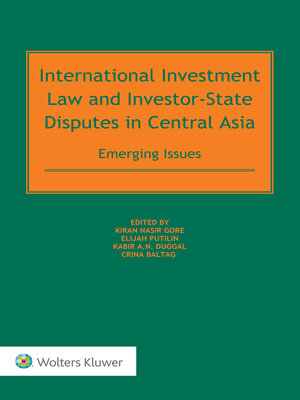International Investment Law and Investor-State Disputes in Central Asia
ebook ∣ Emerging Issues
By Kiran Nasir Gore

Sign up to save your library
With an OverDrive account, you can save your favorite libraries for at-a-glance information about availability. Find out more about OverDrive accounts.
Find this title in Libby, the library reading app by OverDrive.



Search for a digital library with this title
Title found at these libraries:
| Library Name | Distance |
|---|---|
| Loading... |
The five Central Asian States – Kazakhstan, the Kyrgyz Republic, Tajikistan, Turkmenistan and Uzbekistan – collectively present a unique case study for the nexus between international investment frameworks, investor-State dispute settlement (ISDS) and the future of this field. In this groundbreaking book, the editors have curated contributions from globally renowned practitioners and scholars to provide the first comprehensive overview of experiences and lessons arising from the region.
This book draws upon the Central Asian experience with international investment law and ISDS to develop globally relevant insights and analyses on, among other topics:
approaches to foreign direct investment and domestic investment legislation;
jurisdictional questions arising in investment treaty arbitration, such as the notion of 'investor' and the definition of 'investment';
the interpretation of investment treaties and the role of international and domestic law;
substantive and procedural rights of foreign investors, with a focus on guarantees against expropriation and most-favoured nation and fair and equitable treatment standards;
arbitral awards, as well as grounds and procedures for their enforcement and annulment;
the state-of-play for allegations of corruption and fraud once a dispute has arisen; and
emerging challenges and opportunities in light of ongoing reform initiatives.
This book establishes that the Central Asian experience should be taken into consideration in any comprehensive and robust discussion on the future of international investment law and ISDS. It provides useful analyses of how these frameworks may be improved, reformed and remain fit for purpose. This book is an essential tool that allows practitioners, arbitrators, policymakers and scholars to confidently engage with the substantive and procedural challenges and opportunities that are anticipated in the next generation of investor-State disputes.







